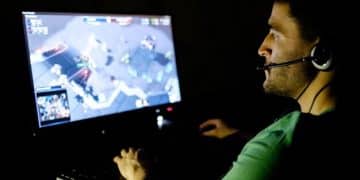Esports Education: Launching Successful Academies in the US

Esports Education Programs are gaining traction in the US, with academies designed to cultivate future talent through structured training, academic integration, and professional development.
The booming esports industry demands skilled players, coaches, and managers. Esports Education Programs: Launching Successful Academies in the US to Develop Future Talent, addresses this need, providing structured pathways for aspiring esports professionals to hone their skills and knowledge.
The Rise of Esports Education in the US
Esports is no longer just a hobby; it’s a burgeoning industry with lucrative career opportunities. Recognizing this, educational institutions across the US are beginning to integrate esports into their curricula, offering programs that blend academic rigor with specialized esports training.
These programs aim to provide a well-rounded education that prepares students for various roles within the esports ecosystem.
The Need for Structured Esports Training
Unlike traditional sports, esports lacks a well-defined training infrastructure. Many aspiring players rely on self-teaching and unstructured practice, which can limit their potential.
Formal esports education programs offer structured coaching, skill development, and strategic analysis, helping players reach their peak performance.
- Skill Development: Focused training modules to improve reflexes, decision-making, and game-specific skills.
- Strategic Analysis: Detailed study of game mechanics, strategies, and opponent analysis.
- Teamwork and Communication: Emphasis on collaboration, communication, and teamwork within an esports team.
- Physical and Mental Wellness: Guidance on maintaining physical fitness, managing stress, and promoting mental well-being for optimal performance.
By combining rigorous training with academic knowledge, these programs equip students with the tools they need to succeed in the competitive world of esports.
Key Components of Successful Esports Academies
Launching a successful esports academy requires careful planning and execution. Several key components contribute to the effectiveness of these programs.
These components range from comprehensive curriculum design to state-of-the-art facilities.

Curriculum Design and Academic Integration
A well-designed curriculum is the foundation of any successful esports academy. The curriculum should balance esports-specific training with traditional academic subjects.
Integrating academic subjects ensures that students receive a comprehensive education that prepares them for various career paths, both within and outside of esports.
- Esports Theory and Strategy: Courses covering game theory, strategic analysis, and competitive strategies.
- Game-Specific Training: Focused training on popular esports titles, such as League of Legends, Counter-Strike: Global Offensive, and Overwatch.
- Digital Media and Content Creation: Instruction on creating engaging content for streaming platforms, social media, and esports journalism.
- Business and Management: Courses on esports business models, marketing, and team management.
By integrating these elements, esports academies can provide a holistic education that prepares students for a range of roles within the industry.
Facilities and Equipment
State-of-the-art facilities and equipment are essential for creating an optimal training environment. Esports academies should invest in high-performance gaming PCs, ergonomic chairs, and advanced audio-visual systems.
These investments can enhance the training experience and provide students with the tools they need to compete at the highest level.
- High-Performance Gaming PCs: Top-of-the-line computers with high refresh rate monitors and low latency peripherals.
- Ergonomic Chairs: Comfortable and adjustable chairs designed to support long hours of practice.
- Advanced Audio-Visual Systems: Professional-grade microphones, cameras, and streaming equipment for content creation and broadcasting.
- Dedicated Practice Spaces: Soundproofed rooms designed for team practice and individual training.
Equipping students with the right tools can make a significant difference in their performance and overall development.
Building Partnerships with Industry Professionals
Collaborating with industry professionals can provide valuable insights and opportunities for students in esports education programs. Establishing partnerships with esports teams, game developers, and other industry stakeholders can enhance the learning experience and open doors for internships and job placements.
These partnerships can provide real-world experience and networking opportunities that are crucial for career advancement.
Mentorship and Coaching
Experienced coaches and mentors can provide personalized guidance and support to students, helping them navigate the challenges of the competitive esports landscape. Mentorship programs can pair students with industry veterans who can offer advice on skill development, career planning, and professional networking.
This guidance can be invaluable in helping students reach their full potential.
Internships and Job Placements
Providing internship opportunities with esports teams, gaming companies, and media outlets can give students hands-on experience in their chosen field. Internships can help students build their resumes, develop professional skills, and make valuable industry connections. Many esports academies have seen great success by partnering with local and national esports organizations.
These experiences can significantly improve their chances of securing full-time employment after graduation.
Networking Opportunities
Hosting industry events, workshops, and conferences can bring together students, professionals, and thought leaders in the esports community. These events can provide students with opportunities to network, learn about industry trends, and showcase their skills to potential employers.
Networking is essential for building relationships and finding opportunities in the competitive esports industry.

The Role of Academic Support in Esports Education
Academic support is a crucial component of esports education programs, ensuring that students receive a well-rounded education alongside their esports training. Balancing academic studies with intensive esports practice can be challenging, so providing resources such as tutoring, time management workshops, and counseling services can help students succeed academically.
These resources can address the unique challenges faced by student-athletes in the esports realm.
Tutoring and Academic Counseling
Offering tutoring services in core academic subjects can help students maintain their grades and stay on track for graduation. Academic counseling can provide guidance on course selection, study skills, and career planning, ensuring that students make informed decisions about their education.
This support can help students balance their academic and esports commitments.
Time Management and Study Skills Workshops
Workshops on time management, organization, and study skills can equip students with the tools they need to manage their busy schedules effectively. These workshops can teach students how to prioritize tasks, set goals, and create study habits that promote academic success.
Effective time management is essential for balancing esports training with academic studies.
Mental Health and Wellness Programs
Esports can be a demanding and stressful activity, so providing mental health and wellness programs can help students cope with the pressures of competition. These programs can offer counseling services, stress management techniques, and mindfulness exercises to promote emotional well-being.
Supporting students’ mental health is crucial for their overall success and happiness.
Measuring Success and Outcomes
To evaluate the effectiveness of esports education programs, it’s essential to establish metrics for measuring success and outcomes. These metrics can include academic performance, esports skill development, career placements, and student satisfaction.
By tracking these metrics, programs can identify areas for improvement and demonstrate their value to stakeholders.
Tracking Academic Performance
Monitoring students’ grades, attendance, and graduation rates can provide insights into the academic impact of esports education programs. Comparing the academic performance of esports students to that of their peers can help determine whether the programs are successfully integrating esports with academics.
This data can inform program improvements and demonstrate the value of esports education.
Assessing Esports Skill Development
Regularly assessing students’ esports skills through performance metrics, competitive results, and coach evaluations can track their progress and identify areas for improvement. This assessment can help determine whether students are developing the skills and strategies needed to succeed in esports.
This data can be used to refine training methods and enhance the curriculum.
Monitoring Career Placements
Tracking students’ career placements after graduation can provide insights into the long-term impact of esports education programs. Monitoring the number of students who secure jobs in esports-related fields, such as professional gaming, coaching, content creation, and esports management, can demonstrate the programs’ effectiveness in preparing students for esports careers.
This data can help attract prospective students and demonstrate the value of esports education to employers.
| Key Point | Brief Description |
|---|---|
| 🎮 Structured Training | Formal esports education provides structured coaching and skill development. |
| 🤝 Industry Partnerships | Collaborating with esports teams and game developers enhances learning. |
| 🧠 Academic Support | Tutoring and counseling help balance academics and esports. |
| 📊 Measuring Success | Tracking academic, skill, and career outcomes is essential for evaluation. |
FAQ
▼
Esports education programs provide structured training, academic integration, and industry connections, enhancing skill development and career opportunities for aspiring esports professionals, offering a balanced approach crucial for long-term success.
▼
Esports academies integrate academics by offering courses in esports theory, game-specific training, digital media, content creation, and business management, ensuring a comprehensive education that prepares students for various career paths.
▼
Industry partnerships provide mentorship, coaching, internships, and job placements, offering students real-world experience, networking opportunities, and valuable insights from esports teams, game developers, and media outlets.
▼
Academic support includes tutoring, academic counseling, time management workshops, and mental health programs, helping students balance their esports training with academic studies and cope with the pressures of competition to ensure well-being.
▼
Success is measured by tracking academic performance, esports skill development, career placements, and student satisfaction, providing insights into program effectiveness and areas for improvement to demonstrate value to stakeholders.
Conclusion
Esports Education Programs: Launching Successful Academies in the US to Develop Future Talent, is essential for nurturing the next generation of esports professionals. By focusing on structured training, academic integration, industry partnerships, and robust support systems, these academies can equip students with the skills and knowledge needed to thrive in the competitive esports landscape.





